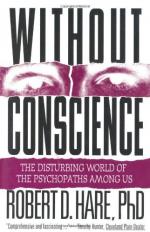
|
| Name: _________________________ | Period: ___________________ |
This test consists of 15 multiple choice questions and 5 short answer questions.
Multiple Choice Questions
1. What reaction from professionals often frustrates spouses of psychopaths?
(a) Professionals are more easily tricked than lay people.
(b) Professionals often want to incarcerate the psychopath.
(c) Professionals often believe the psychopath rather than the victim.
(d) Professionals have little useful advice to offer.
2. When do psychopathic children lie when normal children would not?
(a) When lying is possibly going to be uncovered.
(b) When those around them are aware of the truth.
(c) When it's going to get them into more trouble.
(d) When lying won't prevent punishment.
3. How do psychopaths perceive the world?
(a) The world is waiting to be plundered.
(b) The world is a paradise.
(c) The world is a hostile place.
(d) The world is a garden of opportunity.
4. Why is it important to avoid power struggles with a psychopath?
(a) They will always win.
(b) They will take revenge if you defeat them.
(c) They are smarter than the rest of us.
(d) Their need for dominance causes them to focus on winning.
5. What group is a frequent source of victims for psychopaths?
(a) Naive women.
(b) Lonely women.
(c) Unmarried women.
(d) Older women.
6. What do psychopaths feel for their victims?
(a) Total indifference.
(b) Disgust.
(c) Intense hatred.
(d) Unusual interest.
7. How did Clifford Olson see himself during his trial?
(a) As a hero.
(b) As a victim.
(c) As a scapegoat.
(d) As a celebrity.
8. How are psychopathic children distinguished from normal kids?
(a) They are cuter and more likely to be spoiled.
(b) They are overindulged by their parents.
(c) They are more difficult and harder to understand.
(d) They are more intelligent.
9. Why did one psychologist run off with her psychopathic patient?
(a) She believed his promises.
(b) She was studying his case.
(c) She was trapping him into revealing himself.
(d) She wanted to do field work on his methods.
10. Who was Amy Fisher?
(a) Tokyo Rose.
(b) The Mata Hari of New York.
(c) The Long Island Lolita.
(d) A Playboy bunny murder.
11. How do psychopaths know what emotions to display to others?
(a) They read psychology texts.
(b) They use their listeners' reactions as cues.
(c) They study films.
(d) They take acting classes.
12. How can you protect yourself from a psychopath's flattery?
(a) Flatter him in return.
(b) Decide whether what he says is true.
(c) Know your own weak spots.
(d) Avoid conversation with him.
13. How did a psychopath flatter forensic psychologist J. Reid Meloy?
(a) By telling Meloy he was handsome.
(b) By offering to work for Meloy without pay.
(c) By telling Meloy how impressed he was with his writing.
(d) By quoting from Meloy's published work.
14. What does the author see as the antidote to inaccurate diagnoses?
(a) Careful comparison with similar cases.
(b) Careful use of sound scientific procedures.
(c) Careful study of an offender's background.
(d) Careful attention to a defendant's explanations.
15. How do psychopaths treat those in positions superior to them?
(a) They ingratiate themselves.
(b) They mock them.
(c) They brutalize them.
(d) They con them.
Short Answer Questions
1. What did one psychopath say made a good liar?
2. What does Hervey Cleckley see as the main difference between psychopaths who are not incarcerated and those who are?
3. For the psychopath, crime is a natural result of what?
4. How do psychopaths see themselves in relation to others?
5. Why do clinicians hesitate to label a child psychopathic?
|
This section contains 607 words (approx. 3 pages at 300 words per page) |

|




